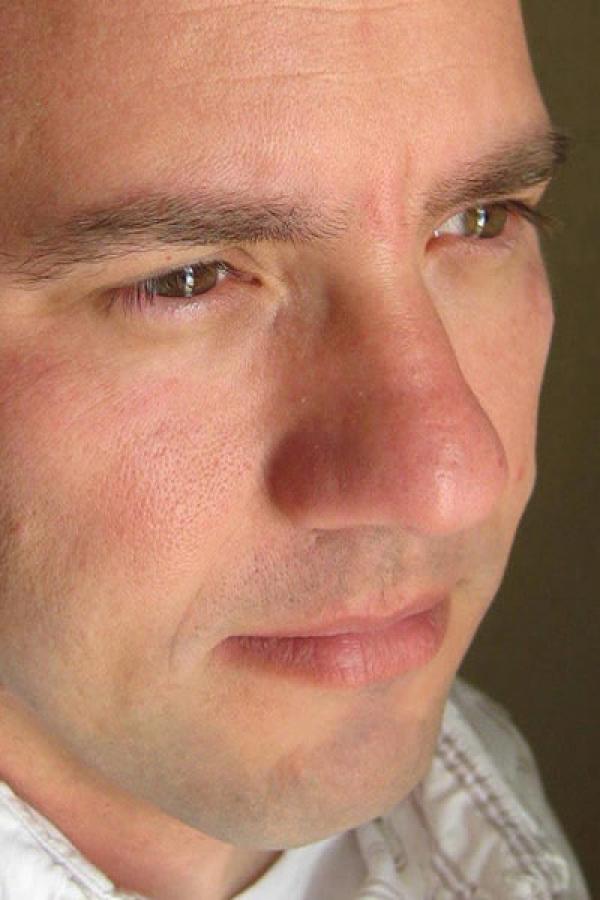Scott Kaukonen

Photo courtesy of Scott Kaukonen
Bio
Scott Kaukonen is the author of the short story collection Ordination, winner of the Ohio State University Prize for Short Fiction. He's a winner of the Nelson Algren Prize from The Chicago Tribune and a former AWP/Prague Fellow. His stories and reviews have appeared in Third Coast, The Chicago Tribune, The Missouri Review, and The Cincinnati Review. A Michigan native, he received his MFA from the University of Arizona and his Ph.D. from the University of Missouri-Columbia. He's currently an assistant professor at Sam Houston State University in Huntsville, Texas.
Author's Statement
I am currently completing a novel that explores the intersection of American Evangelicalism with American consumer culture over the figure of a dead sixteen-year-old Baptist preacher's daughter. You might say it's a novel about martyrdom and marketing, memory and myth. It's a novel I've been wrestling with for several years now, and my security about it rises and falls from week to week. The NEA grant arrives at a much appreciated time for me, the kind of external validation that confirms your internal sensibility - that you can do this, that you should do this, that you are doing this. I am most grateful.
From the short story "Punnett's Squares"
I reached for a tassel, guided by touch more than by sight, and I slid my hand down and wrapped my fingers around it and yanked upwards, felt the root of the tassel give way. With my opposite hand I reached for another tassel and then a third and the next and the next, the dew-soaked seeds slick on my hands. The leaves of the stalks brushed against my blue rain slicker and the soft damp earth gave way beneath my tennis shoes. The tassels were always more difficult in the morning, the stalks swollen with water, our hands cold and wet, the skin shriveled, and when I couldn't finesse the tassel, I overpowered it, bent it to my will. I ripped away the top section of the stalk. I knew I was costing the farmer yield, but he would never know.
Ahead, Tommy seemed to glide between the rows of seed corn, his body always moving forward, his hands crossing and criss-crossing above the stalks, pulling and dropping the tassels, one pulling, the other dropping, pulling and dropping, pulling and dropping. There was a steady percussion of sound, everything in rhythm. His shoulder dipped to catch an undergrown shoot, but he didn't miss a beat, caught the next tassel in stride, lifted upward, then opened his hand and the tassel fell as he reached for the next. Whenever I fell behind and the distance between us grew too great, Tommy back-picked my row until he reached me. I was always embarrassed, my thick fingers fumbling. When I muttered, "Thanks," Tommy ignored it, just walked with me up the rows until we reached the place where we had to begin again.
We hated the cornfield. This was my second season; it was Tommy's third. Still, it was better than the only other option we had - as summer help in the factories where our parents worked, bottom-rung jobs in the residue-choked air, the chemicals that stained your skin and inhabited your lungs, the relentless scream of high-speed sanders and drills, the violent rip of metal against metal. There would be the oil-slick floors to be swept again and again, and that seat across the table from your father every day at lunch or the ride home with your mother at the end of the shift.
Tommy was already pulling away from me again, pulling two tassels to every one I pulled. I didn't care. I stopped and crouched down, untied my damp shoelace and tied it again. When I stood up, I looked back for the one-armed kid, but he was nowhere to be seen. I wondered if Tommy would pick back on the kid or if he'd leave him to fend for himself. I wondered if the kid had quit and gone home, and if we'd have to go back at the end of the day to finish his rows.
"Tommy," I hollered. I couldn't see him, but I heard the rustle of leaves stop and so I knew he had heard me.
"What?" he hollered back.
I wanted to ask him about Katrina Liptz, to ask him everything he knew, but I was afraid of what he might reveal. Every morning I tried to find her in the small crowd that gathered at the edge of the field. When I found her - the long, thin girlish body; blue eyes that always awoke me from the last fits of sleep; blonde hair in a summer ponytail - I edged my way in her direction in the hope that I would somehow end up near her, perhaps in the same block, in side-by-side rows. Maybe we'd strike up a conversation, something to fill the time. We'd find something in common, make each other laugh, and realize that all this work wasn't so bad after all, not when you're amongst friends.
"Do you think she doesn't like me because I'm Asian?" I asked.
"Who?"
"Katrina."
"I don't think she knows you exist. I don't think she even knows your name."
"But even if I did?"
"Tell your name?"
"Yeah."
"Well, then I suppose you'd have to try not to act like you're acting now."
"What do you mean?"
"You're being an idiot, Ichi. If you're an idiot, it don't matter to her what else you are."

